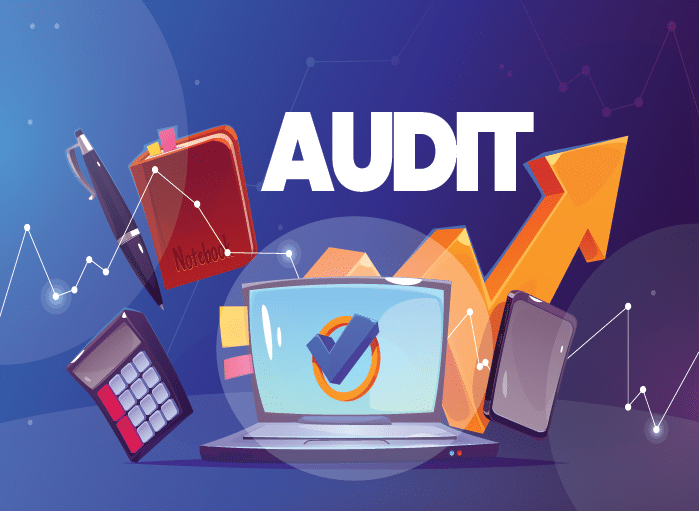
What is Website Audit & How is it Going to Help You in Your Business?
Tags: Website Audit,Website Performance
eWay Corp October 18, 2022 2 MIN READ

Does my site need a website audit? Or is a site audit helpful for a business?
Imagine the scenario. You run a gift store business and have a well-designed website but, you are not getting enough leads for your business.
It could be for various reasons, such as your website is not aesthetically pleasing, or if the site is not user-friendly. Keep in mind that a fully functional website can make a big impact on how potential customers are going to perceive your business.
To gain true value from a website, it is important to ensure that the site can create and maintain a positive user experience. This is when you will need to carry out a website audit to check if the site meets the search engine standards.
In today’s post, you will learn about site audits, their importance for your business, and some other parameters.
Let’s dive into the details!
Website Audit: What is It?
A website is the building block of a strong online reputation. A strong online presence would automatically improve the credibility of your business.
A comprehensive website audit or site audit would help webmasters to assess and analyze the site for any issues and resolve it.
A site audit is not only about SEO, but it is also about many other things, like the health and performance of your site. Or it allows webmasters to assess page performance before conducting large-scale SEO.
A complete website audit would allow digital marketers to ascertain whether the site has been optimized to be met traffic goals.
To be more specific, a site audit allows digital marketers to thoroughly examine the site and ascertain its smooth functioning, seamless user experience, and security process. It also calls for improving the user experience by working on the technical issues on the site.
By conducting this website audit, webmasters would be able to:
- Offer an in-depth analysis of your site
- Discover issues that are affecting the site’s performance
- Evaluate the site based on certain parameters for ascertaining its visibility in Google’s search rankings.
- Propose the areas on the website that needs improvement
- Improve the website traffic and generate leads
- Increase user-engagement
Types of Website Audit
Before going ahead with the importance of auditing a website, let’s review some of the types of audits that digital marketers carry out from time to time.
Let’s look below:
Competitive Website Audit
This would allow webmasters to track down your competitors. Webmasters can use the online strategies of your competitors for your brands as well.
Technically, a competitive website audit allows having an in-depth understanding of what’s working and what’s not for your competitors. Accordingly, marketers would implement marketing strategies and give your website an extra edge.
To start with, a SWOT analysis must be carried out. It helps to track down the strength, weaknesses, threats, and even opportunities for the website.
For instance, your competitor’s website has a slow loading time – a weakness of the site, or the site is easy to navigate – the strength of the site, higher rank across SERPs – a threat to your site, and so on. So, with the site audit, you will learn how to run your website more efficiently and outrank your competitors.
Design Audit
It would help to ensure that your site’s design is visually appealing for an enhanced user experience. For instance this audit will examine if the site structure, content, and even the colors would offer a great user experience or not.
SEO Link Audit
Just like other website audits, an SEO link audit would evaluate your links and optimize the site to get ranked for target keywords.
This tool determines whether value and link juice are being transmitted to the pages since it considers the domain, URL source, and anchor texts. Thereby, allowing you to measure how much the link is helping or hurting the site’s visibility in SERPs.
Also, links from respected newspaper sites or journals are highly valuable than links coming from a lesser-known site. To carry out an SEO link audit, it’s important to gather all link data. This can be done through the Google Search Console. But if you are not sure, it’s better to take the help of a site audit company.
Lead Conversion Optimization Audit
This audit analyzes the site’s conversion issues and opportunities. With this site audit, you will know how and from where the traffic is coming to your site. It can help you to understand your target audience’s behavior and accordingly optimize the site’s content to meet their needs.
In this regard, the entire content of the website is analyzed to check if it’s informative and up to date. The latest information about your business and information must be present on the site. Some other factors that need to be observed are:
- Checkout Process: If you notice too much shopping cart abandonment, it’s because of the checkout process. Most likely customers are facing certain issues during the checkout and hence abandoning the cart.
- Forms: You should check if your forms are gathering enough information to get in touch with potential leads.
- Design & Layout: The CTAs for your website should be clear and visible. If it’s small, then it won’t serve its purpose. The website should be easy to navigate. During the lead conversion audit, the design and layout are checked properly to meet the set standards.
- User–Experience: Are users or visitors happy with your site? Are they having a good experience when visiting and navigating your site? If not, then the issues must be addressed.
Social Media Audit
Your brand should have a strong online presence. Its presence can be improved through social media. In case, your social media isn’t helping you to get a lot of traffic, it’s time to carry out a social media audit.
This audit will help you to evaluate the performance of the social media accounts. You can ascertain if the social media accounts are consistent with the branding and is having the same logo, images, and tone. Also, you can check if the social media pages are updated frequently or not.
Based on the evaluation, information can be offered, and social media accounts can be optimized for increased engagement.
SEO Website Audit
A SEO website Audit would evaluate the factors that might impact the site’s performance in SERPs. It includes SEO links, page speed, image SEO, video optimization, and so on.
You can carry out site audits on your own, but it’s better if you take the help of a site audit company. Being professionals, they know their job well and would carry out website audits in such a manner that would benefit your site greatly.
Key Factors to Consider When Carrying out SEO Website Audit
You might know the search engine decides the ranking factor of a site based on the user experience. So, when you opt for a site audit service, you will get a complete website analysis of your site’s performance based on certain factors. Doing a website audit will let you know the areas in your site that don’t meet these factors but are essential for the search engines to rank the site in the SERPs.
Now, let’s investigate those factors!
Page Speed
It’s a key factor that search engines consider while ranking any web page in the SERPs. Hence, it’s important to check if your site is taking too much time to load or not. With a website audit, you can find out the pain points that are impacting your site’s load time.
On-page SEO
During the audit, the search engine pots will be able to identify each page on the site. It would check:
- If each page is having a unique topic.
- If each page is having a primary keyword in the page title, meta description, images, anchor texts, and so on.
- Check for duplicate pages.
- Look out for the H1, H2, and Redirects.
- Check out if the site is having SEO-friendly URLs.
- Check whether the site is having structured data or not.
Robots.txt File
You know well that all pages of your site are not indexed. The best place to look for those non-indexed pages is the robots.txt file.
When some pages are blocked, Google can’t index them. So, while carrying out a website audit, make sure to search for such pages and then disallow them.
Mobile Friendly
If your site is not mobile-compatible, it won’t increase the ranking of your site or page. To get an edge over your competitors, mobile compatibility is a must. During a site audit, the following elements are checked. They are:
- The site is having a responsive design.
- All images are compressed
- YouTube Video links are embedded
Broken Links
It is the main cause of bad user experience and poor ranking on Google. So, when performing a site audit, webmasters will check for any broken links on your site and fix them.
XML Sitemap
Make sure to update the XML sitemap on the website. This sitemap should be submitted to the search engines. So, this audit would ensure the site meets this criterion.
Social Media
Social Media is an important channel for generating leads. Hence, a site must be connected to all social media channels. So, social media icons must be present on every page of the site.
The share buttons for social media channels must be enabled. End-users should be able to access it. During the website audit, these points are checked properly.
Image SEO
Image SEO can significantly improve the ranking of a page. So, digital marketers must ensure that the image file name is matched with the image. They should also check for Alt tags that are defined for the images. The site audit would help to ensure these pointers are fulfilled.
User-Friendly
The main goal of a website is to attract traffic and generate leads. But, in some cases, you might see your site is getting leads but it’s not getting conversions. It happens in most cases when the site is not user-friendly.
To prevent potential leads from leaving the site abruptly, the user-friendliness factor must be improved. While performing a website audit, the user-friendliness of the site is checked. It is done by:
- Checking whether the users can find the product/service they are looking for within 2-3 clicks.
- By checking if the site is having a smooth navigation process.
- Tracking the user journey through the search-engine console and finding out the areas where dropouts are taking,
- Make sure the site is having proper about us information, contact details, and a privacy policy.
- A consistent interface throughout the site.
How to Conduct a Website Audit?
Now, that you have some idea about website audits and their types, it’s time for you to learn the process of conducting a website audit. Read on.
A site audit requires a lot of hard work, especially when you are working on a website with multiple pages with many tags, links, images, and other factors that must be evaluated.
Here’s how to carry out a complete site audit for your site and take full advantage of it.
Using the Auditing Tools
Plenty of free site auditing tools are available in the market that claims to make your auditing task easier. Only a few of them are reliable for the website audit process.
However, you might not get the same level of accuracy as offered by the premium tools used by the professionals of any site audit company.
Run the Site’s URL Through a Site Audit Tool
You will need to use a website audit tool that would analyze your site’s performance. With the help of the tool, marketers would carry out certain functions.
Marketers can locate technical problems, find issues with internal and external links, produce a list of issues that must be addressed, identify poor content, pin down SEO issues, and also evaluate website page issues.
Find Out Technical Errors
Well, technical errors, like page load time, mobile friendliness, robot files, or even security can impact the customers’ experience on your site. When you observe visitors leaving your site soon, a site audit would help you to ascertain the reasons for the same.
Identifying SEO Problems
Now, SEO-related issues should be investigated for improving the ranking across search engines. After all, SEO and technical issues are closely related.
The site auditor tool would crawl the site and alerts you about SEO-specific issues, such as meta descriptions, reviewing headings and subheadings, length of title tags, the correctness of schema.org, etc. Once the issues are identified the tool would suggest ways to resolve them.
Analyze the Design and UX
Poor design can prevent visitors from visiting your site again. So, by evaluating the usability and design of the site, your website’s navigability and user experience can be optimized.
You need to check if the design of your website is working for your customers or not. So, the website audit can analyze if the overall design is made keeping users in mind. If it’s the case, then the site’s user experience would be a positive one and the conversion rates would naturally increase.
Assess Website Content
Content plays an integral part in a site’s usability and effectiveness. Good and updated content would draw more visitors to your site. Thereby, boosting the site’s SEO.
Search engines can easily locate if the content is plagiarized or outdated. So, you need to ensure that each page of your website is having unique content.
With a website audit, you can identify the pages that need to be updated with relevant content immediately. Or, you can know about the pages that are having a good ranking.
Also, with a site audit, certain issues can be addressed. They are:
- Ensuring that the content is using right keywords
- Checking if the content is mobile-friendly with proper white space
- Pinpoint the filler content or grammar/spelling mistakes in the content
- Ensuring the content follows the latest SEO guidelines
You need to ensure that the content is reaching the potential audience. Only then it would help your business to get potential traffic and conversions.
Create a Checklist of Site Issues
Once the auditing tool has finished scanning the site for technical, usability and design, SEO, and other issues, it would generate a report and checklist for your site. You can use this report to address the issues. Or simply take it to any site audit company to address them one by one.
Many site audit companies would also carry out the fixes and make the site ready for maximum traffic and conversions.
How it can Help Your Business?
The purpose of a website audit is to help digital marketers to get a clear picture of the health, performance, and speed of your site.
Periodic audits would help businesses in the following ways. They are:
Improved User Experience
Are you fed up with poor user experience reports for your site? If you said, yes, you have nothing to worry about. Carry out a website audit to fix issues, like easy navigation, mobile-friendly, and faster loading time, which are crucial elements for an enhanced user experience.
A greater user experience is guaranteed as the issues get resolved. This would automatically increase the conversion for your site.
Increased Conversion Rate
Every business owner wants to get a good number of leads and conversions. A proper audit would identify the issues of your site that are hindering the conversion. Once the issues are fixed, it would help your site with an increased conversion rate. The improved conversion rate would automatically improve business opportunities.
Improved SEO
You know that optimizing a website and its content, could greatly improve the site’s SEO. A website is optimized for both SERPs and even for users.
Basically, with a website audit, one can work on the issues that crop up across the major SEO categories, such as on-page, off-page, and technical. Improve the site’s ranking and traffic by resolving the issues.
Improve Site Performance
By carrying out a website audit, you can improve your site’s performance. Issues like long loading time would disappoint visitors easily.
It would also affect the site’s SEO. Only a site that loads quickly would be able to perform better. This would help your business to get essential target customers.
Increase the Site’s Visibility
Google’s Algorithm keeps on changing. So, you need to keep your site updated with the changes. Having a proper SEO strategy in place would improve the site’s visibility. Thereby, helping the site rank well in the SERPs.
Increased Security and Privacy
You should be responsible for keeping your customer’s information well-secured. A security breach could do great damage to your site and even to your business. Conducting a website audit for your site would help you to determine if the customer information has been compromised or not.
Final Thoughts
Just having a website with informative content isn’t enough. It’s crucial to evaluate every aspect of the site for seamless navigability, improved user experience, and optimal performance. This is where a website audit comes into the picture.
With periodic website audits, you can improve the efficiency and visibility of your site. At the same time, it would improve the site’s ranking on Google and increase its traffic. Thus, ensuring a good growth opportunity for your business.
If you need any kind of help with website audit services, feel free to contact eWay Corp. Our team will carry out a complete audit of your website to meet your business needs.



